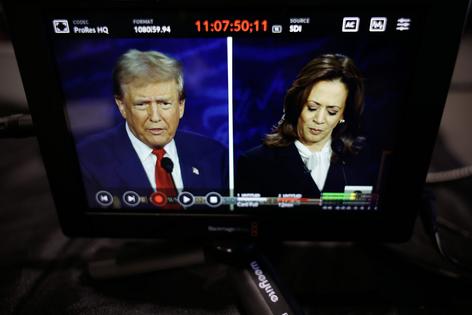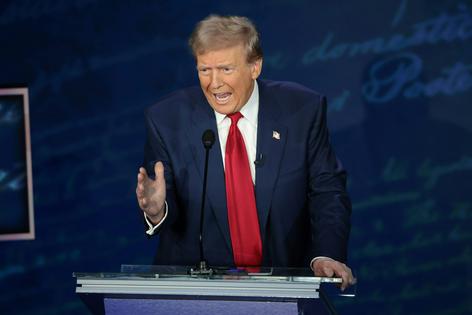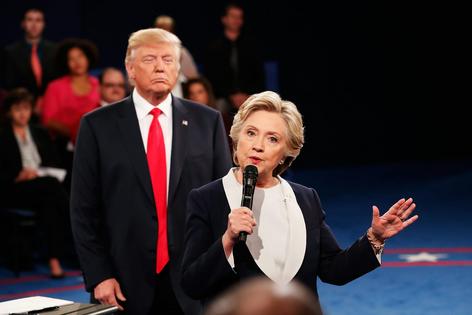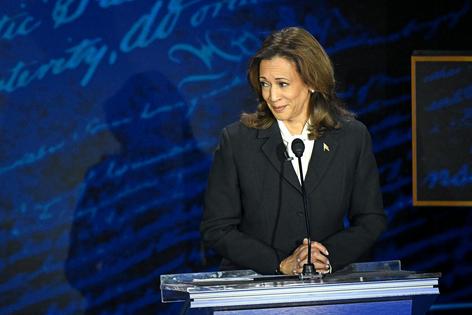Kamala Harris effectively baited Donald Trump during the debate, drawing out his insecure white masculinity
Published in Political News
The Sept. 10, 2024, debate between Democratic presidential nominee Kamala Harris and Republican presidential nominee Donald Trump was a referendum on gender and the U.S. presidency – Trump’s, that is.
During the past decade, U.S. voters have watched as Trump’s toxic masculinity – a particular version of masculinity that discourages empathy, expresses strength through dominance, normalizes violence against women and associates leadership with white patriarchy – took over the Republican Party, was celebrated by tech bros with outsized cultural influence and was matched by authoritarian political leaders around the globe.
Harris’ shrewd debate strategy, however, prompted Trump to morph on stage – from an aggressive and aggrieved showman-provocateur to an insecure and angry white man.
As a communication scholar who studies gender and the U.S. presidency, I am often asked by journalists to comment on women candidates’ fitness for presidential office. I’m rarely asked to comment on how some versions of masculinity might – or should – be disqualifying for a presidential candidate.
When Harris triggered Trump’s insecurity by questioning his popularity and political prowess, his responses were narcissistic, racist and occasionally unhinged from reality.
Trump’s performance in the debate against Harris demonstrates not only that white male insecurity is a strategic liability but also a threat to democracy.
For most of Trump’s political career, academic and journalistic critiques of his persona have emphasized his masculine excesses – penchants for patriarchal authority, a pattern of sexual entitlement and a domineering disposition.
Scholars consulted by The Washington Post in advance of the debate speculated that Trump might come across as a bully, as he did when he debated Hillary Clinton in 2016 and, at times, followed her around the stage.
After that debate, The Guardian described Trump “prowling” behind Clinton as she spoke and “menacing” her with his “imposing presence and brash insults.”
Clinton later said that while she was not intimidated by Trump looming over her, she wanted to “present a composed face to the world.” Although voters accept indignation and even righteous rage from men politicians, some think that a woman politician having an outburst shows her “entitlement and unlikability,” taking it as “evidence of the kind of thin skin that people insist makes a woman unsuitable for the presidency.”
But Clinton’s experience positioned her to give Harris an important piece of advice in advance of the Sept. 10 debate, advice she repeated to The New York Times: “She should bait him. He can be rattled.”
Since the Harris campaign quickly coalesced in July, it has done just that. The campaign has trolled Trump with provocative political ads, posted clips of people yawning at Trump’s rallies on social media and allowed the Democratic National Committee to project Harris running mate Tim Walz’s charge that Trump and Vance are “WEIRD AS HELL” on Trump Tower in Chicago.
During the debate, Harris taunted Trump to his face, asserting that, “people start leaving his rallies early out of exhaustion and boredom.”
After laying the bait, Harris addressed the audience, saying, “And I will tell you the one thing you will not hear him talk about is you. You will not hear him talk about your needs, your dreams and your, your desires.” She concluded her point by promising, “I believe you deserve a president who actually puts you first. And I pledge to you that I will.”
Most politicians would recognize Harris’ obvious rhetorical trap as a ploy to prove her point that Trump cares more about himself than the voters. But an agitated Trump blustered right into it.
After ABC moderator David Muir invited Trump to explain why he killed a bipartisan bill aimed at bolstering security on the Southern border, Trump replied, “First let me respond as to the rallies. She said people start leaving. People don’t go to her rallies. There’s no reason to go. And the people that do go, she’s busing them in and paying them to be there. And then showing them in a different light. So, she can’t talk about that. People don’t leave my rallies. We have the biggest rallies, the most incredible rallies in the history of politics.”
Trump’s hyperbolic response demonstrated how his own insecurity about his rallies’ crowd size left him open to manipulation by his opponent.
Later in the debate, Harris reminded the audience that she wasn’t the only one who could manipulate Trump, and she suggested that this vulnerability could jeopardize American security. She claimed, “It is absolutely well known that these dictators and autocrats are rooting for you to be president again because they’re so clear, they can manipulate you with flattery and favors.”
Russian President Vladimir Putin, Harris told Trump, “would eat you for lunch.”
Trump’s brand of insecure white masculinity is dangerous for democracy not only because it can be manipulated by opponents. A desire to preserve white male supremacy often manifests as racist, misogynistic or transphobic scapegoating.
Communication scholar Patricia Roberts-Miller explains that scapegoating shifts focus away from policy issues and onto members of a marginalized group who can be blamed for society’s ills, fostering a culture in which people are dehumanized and degraded.
After Trump insisted that he had the best rallies, he warned that “World War III” was imminent because of immigrants who were supposedly “eating the dogs. The people that came in. They’re eating the cats. They’re eating – they’re eating the pets of the people that live there.”
This particular falsehood originated as a bizarre and debunked conspiracy theory circulating in right-wing media that alleged Haitian immigrants were eating people’s pets.
Roberts-Miller explains that, historically, scapegoating rhetoric often smooths the way for more serious civil and human rights violations, like when Jews were scapegoated in Nazi Germany and Japanese Americans were scapegoated prior to internment during World War II.
Trump’s fixation on immigrants throughout the debate, and elsewhere, could help rhetorically clear a path for authoritarian policies he has said he would enact, such as using U.S. troops to round up and deport mass numbers of immigrants.
Communication scholar Paul Elliott Johnson argues that Trump’s brand of demagoguery is “defined by a reliance on victimized, White, toxic masculinity.” Some scholars have focused on how this rhetorical strategy appeals to men who are “secretly insecure about their manhood,” as The Washington Post reported in 2018.
Trump’s own white masculine insecurity was on clear display throughout his debate against Harris. It was a different type of pathological masculinity than the aggressive and aggrieved toxic masculinity Trump perfected as MAGA stagecraft.
Trump’s performance in the debate illustrates why insecure white masculinity should be disqualifying for a presidential candidate. When triggered, it short circuits the candidate’s strategic thinking and elicits demagogic and dehumanizing arguments.
The debate between Harris and Trump revealed how vesting authority in an insecure white man is dangerous for democracy.
This article is republished from The Conversation, a nonprofit, independent news organization bringing you facts and trustworthy analysis to help you make sense of our complex world. It was written by: Karrin Vasby Anderson, Colorado State University
Read more:
Starting with a handshake, presidential debate between Harris and Trump then turns fierce, and pointed
Kamala Harris’ message to women on ‘freedom’ helps explain why Black and white Christians are deeply divided over support for Donald Trump
Supreme Court’s ruling in Trump v. United States would have given Nixon immunity for Watergate crimes — but 50 years ago he needed a presidential pardon to avoid prison
Karrin Vasby Anderson does not work for, consult, own shares in or receive funding from any company or organization that would benefit from this article, and has disclosed no relevant affiliations beyond their academic appointment.




































































Comments